Water plays a crucial role in supporting various bodily functions, including digestion, circulation, and temperature regulation. In the case of infants, who have specific needs and vulnerabilities, providing them with adequate hydration is paramount. Breast milk or formula typically fulfills their fluid requirements in the early months of life. However, as they grow older and begin exploring solid foods, the need for supplementary fluids arises.
The question of whether babies can consume spring water is a valid concern for parents seeking to make informed decisions about their child’s well-being. Spring water, known for its natural filtration process and potential mineral content, is often perceived as a pure and healthy source of hydration. But is it suitable for babies? Are there any risks or considerations to keep in mind?
In this article, we will address these questions by examining the characteristics of spring water, understanding the water requirements of babies at different stages of development, exploring safety considerations, and discussing the benefits and potential risks of spring water for infants. By doing so, we aim to provide parents with valuable insights and guidance to make informed choices regarding their babies’ water consumption.
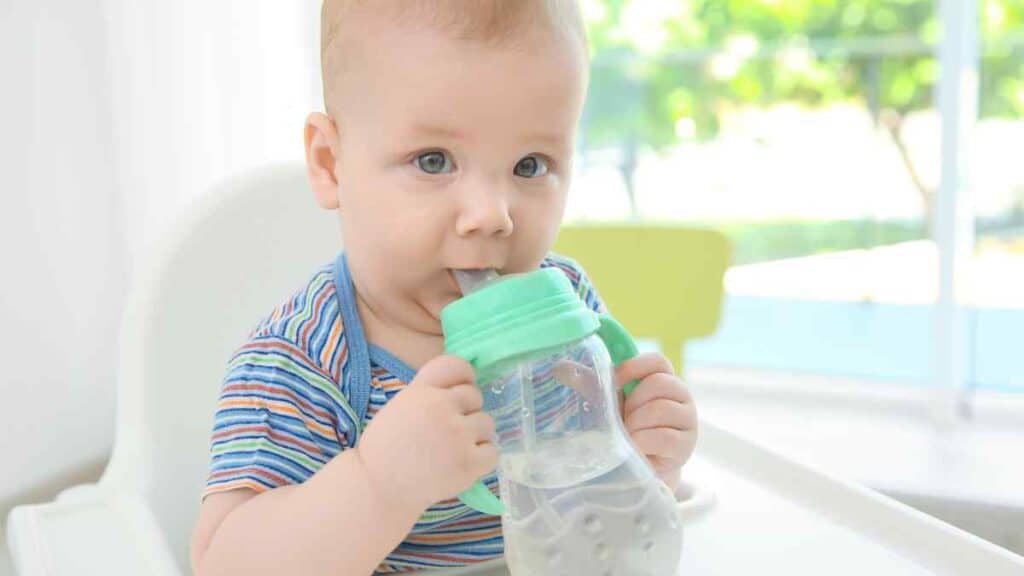
Understanding Spring Water
Spring water, as its name suggests, is water that flows from an underground source to the surface of the earth. This bottled water is often depicted as the pinnacle of purity, but it has unique characteristics that distinguish it from other municipal water types like tap water, distilled water, or purified water.
Characteristics of Spring Water
The fundamental trait of spring water lies in its natural filtration process. As it travels through layers of rock and soil, the water is filtered naturally, with impurities being removed while simultaneously absorbing beneficial minerals.
Contrastingly, purified water, including distilled water, goes through a more intensive process such as reverse osmosis to remove all impurities, including organic chemicals. The outcome is clean water, but it also lacks the natural minerals found in spring water.
When considering water for baby formula, one might wonder about the distinctions between purified vs distilled water. Essentially, while both types are safe and clean, distilled water involves a process of boiling and condensation, making it devoid of minerals. It’s not about distilled vs purified water being safer, but about which nutrients you’d prefer in your baby’s formula.
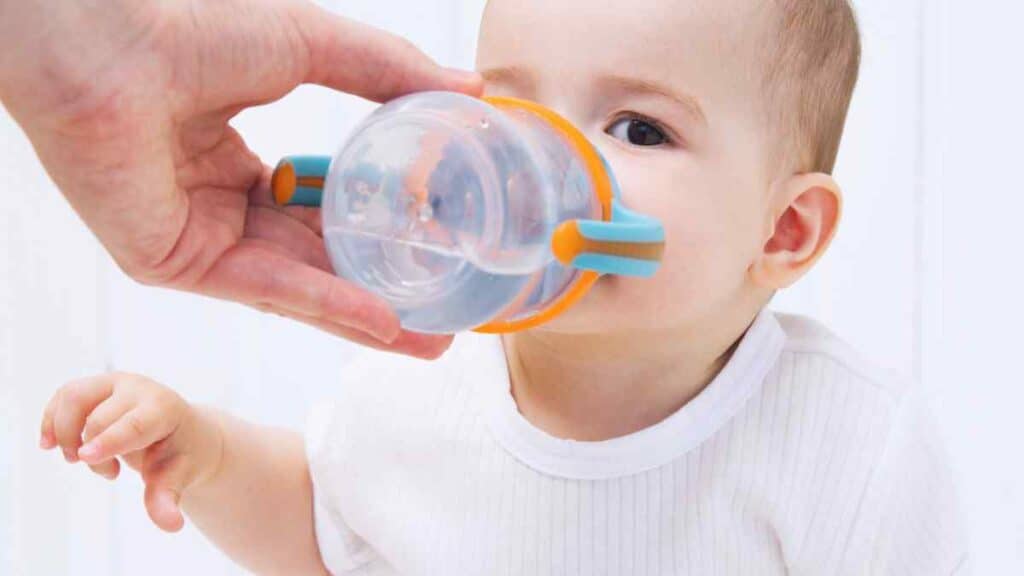
Sources of Spring Water
Spring water sources are abundant worldwide. They’re found where groundwater is forced to the surface, typically in mountainous or hilly areas. As the water travels through the earth, it picks up various minerals, contributing to its taste and potential health benefits.
On the other hand, tap water, while regulated and safe for drinking, may contain traces of chlorine and other chemicals used in the sanitation process. Some may choose low-fluoride bottled water to avoid any potential issues with too much fluoride. While fluoride is important for dental health, excessive amounts can cause faint white lines on teeth, a condition only a dentist can diagnose.
Mineral Content and Potential Benefits
The journey of spring water not only purifies it but also enriches it with minerals such as calcium, magnesium, and potassium. These minerals add a natural taste that you won’t find in distilled or purified water.
For parents preparing infant formula, the question arises: “Can babies drink purified water or distilled water?” Yes, they can, but considering the mineral content in spring water, it may be a preferred choice. Do babies need distilled water? Not necessarily. The crucial factor is that the water used should be clean and safe.
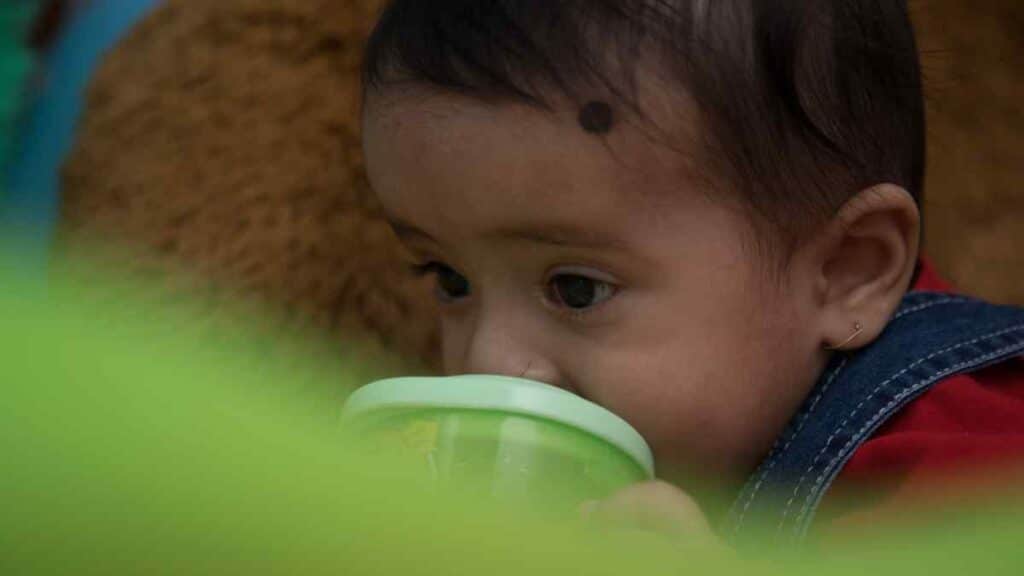
However, remember that when preparing infant formula, boiling water is essential to eliminate any potential pathogens, even if using bottled, distilled, or purified water. This step ensures that your baby’s formula is safe for consumption.
When choosing water for baby formula, avoid sparkling or carbonated water, as it can upset your baby’s stomach. Also, ensure to strike a balance in water intake to avoid water intoxication, as the baby’s kidneys are still developing and may not handle excessive water.
For those concerned about the fluoride content in baby’s water, certain brands offer nursery water, specially designed for babies and often labeled as “fluoride-free” or “low-fluoride”. Nevertheless, consult a healthcare professional for advice on whether your baby needs fluoridated water, especially if you’re considering using it consistently in preparing your baby’s formula.
Is Spring Water Safe for Babies?
Spring water is revered for its natural filtration process and mineral content, often touted as a purer option than tap water. However, when it comes to our little ones, we need to scrutinize the safety of drinking water even more. So, is spring water safe for babies? Let’s delve into the details, considering factors like the baby’s age, health status, and doctor’s advice.
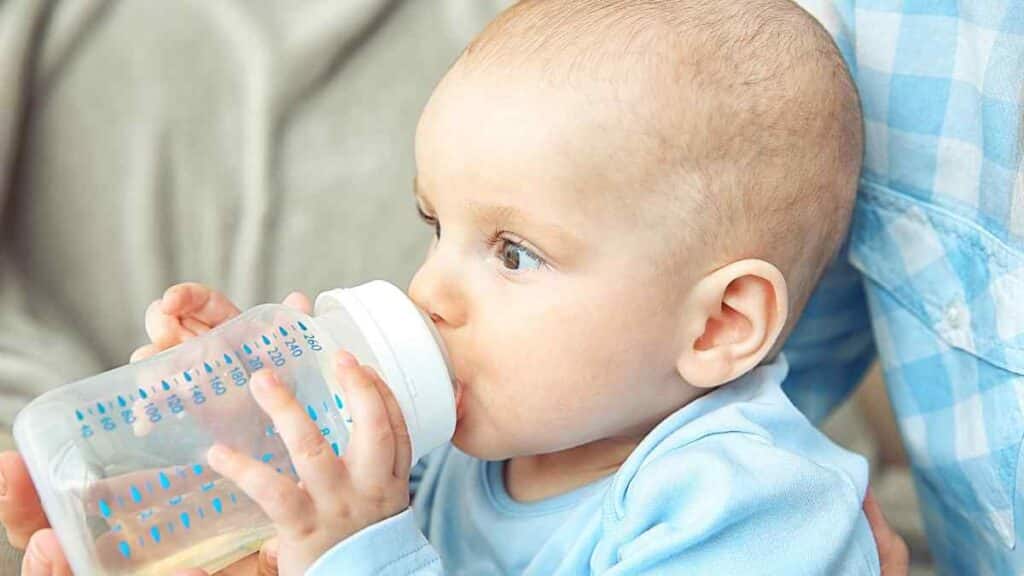
Understanding Spring Water
Spring water emerges from an underground source and travels through layers of rock and soil, absorbing dissolved minerals while naturally filtering out impurities. Compared to other types like bottled water, purified, or distilled water, spring water retains these extra minerals, adding to its taste and potential health benefits.
Baby’s Age and Health Status
When considering whether babies can drink water, including spring water, their age is a significant factor. According to the American Academy of Pediatrics, babies younger than six months should ideally rely on breast milk or infant formula for hydration. Introducing water too early may risk water intoxication, as their kidneys aren’t mature enough to process large quantities of water.
Beyond six months, as the baby begins to consume solid foods, limited quantities of water can be introduced. However, always consult your healthcare provider before making changes to your baby’s diet.
Preparing Baby Formula
When preparing infant formula, the quality of water used is crucial. Even if using bottled water or purified bottled water, boiling it first is recommended to ensure it’s free of any potential bacterial contamination.
When it comes to the debate of purified vs distilled water for babies, both types are safe, provided they’re handled correctly. The primary difference lies in the mineral content, with distilled water being the purest form, devoid of any minerals due to the boiling and condensation process.
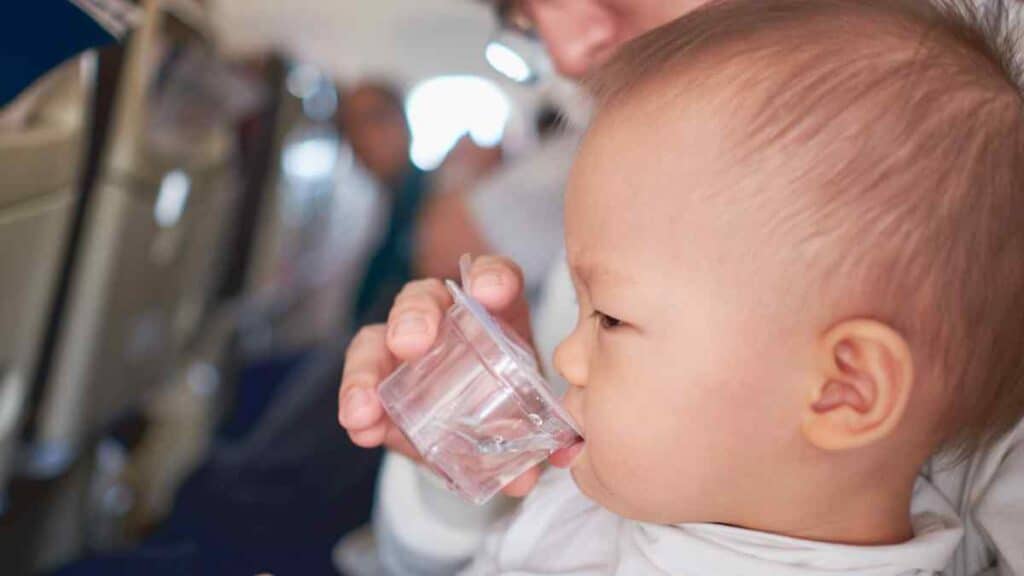
Fluoride in Water
A discussion around water safety for babies wouldn’t be complete without addressing fluoride. While fluoride is beneficial in preventing tooth decay, too much of it can lead to dental fluorosis, which causes faint white lines or streaks on the teeth.
The American Dental Association suggests using water with fluoride levels below 0.7 parts per million (ppm) for baby formula to limit the risk of fluorosis [1]. If using municipal water, it’s essential to have your water tested for fluoride levels. In areas with high fluoride, well water, or if you’re using certain types of packaged water like mineral water, consider using low-fluoride or fluoride-free tap water alternatives.
Consultation with Health Professionals
It’s always wise to consult with your healthcare provider or local disease control center when choosing water for your baby. They can provide advice tailored to your baby’s specific needs and local water supply conditions.
Also, consider the baby’s intake of wet diapers, especially in hot weather, as water dilutes the nutrients from breast milk or formula that babies need for growth. So, the baby’s water intake should be balanced and not replace necessary feedings.
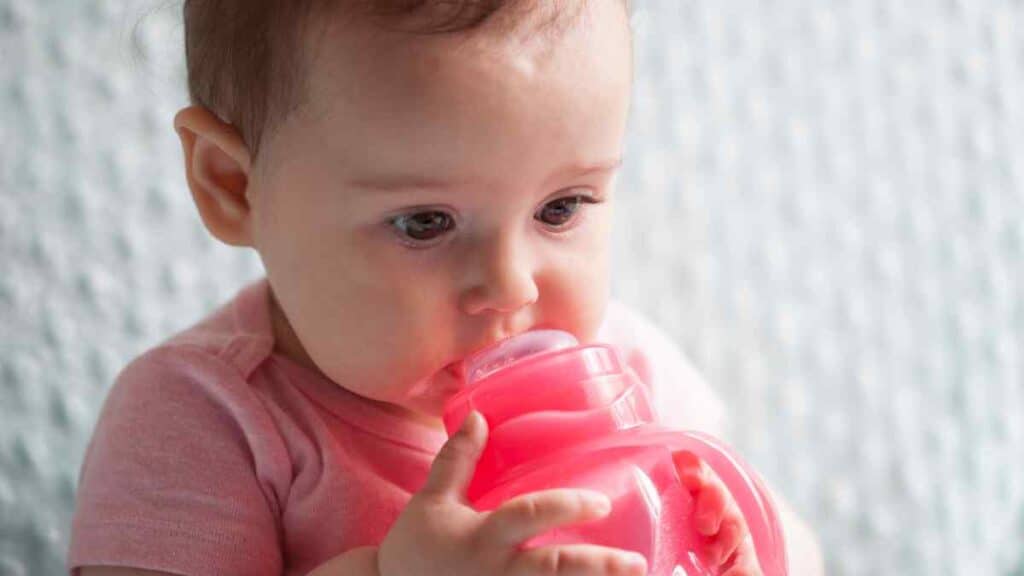
Preparing Baby Formula with Spring Water
Whether you’re a new parent or an experienced one, preparing baby formula can sometimes be a daunting task, especially when considering the type of water to use. So, how can you use spring water for baby formula? Let’s discuss the steps and considerations involved in formula preparation with spring water.
Step-by-Step Guide
- Choose Spring Water: Look for bottled spring water from a reputable brand. Avoid using water from public taps or private wells unless they’ve been tested for safety.
- Boil the Water: Regardless of whether you’re using spring, tap, or bottled water, always boil the water first. This helps to kill any potential bacteria or other contaminants. Bring the water to a rolling boil and continue boiling for at least one minute.
- Cool the Water: Let the boiled water cool down to a safe temperature (around 70°C/158°F) before mixing with formula. Boiling and cooling the water are important steps in ensuring safe drinking water for your baby.
- Prepare the Formula: Follow the instructions on the formula packaging to measure the correct amount of formula powder. Add it to the cooled, boiled water and shake well until the powder is fully dissolved.
- Serve or Store: The formula is now ready for your baby. It can be served immediately or stored in the refrigerator (not the freezer) for up to 24 hours.
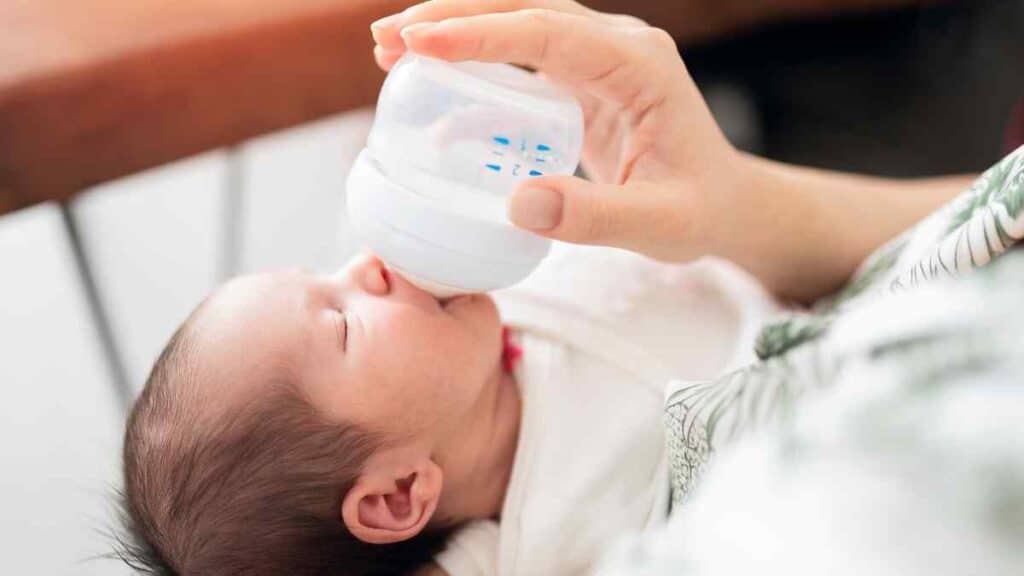
Importance of Boiling Water
Boiling water before use is crucial in eliminating harmful bacteria that could potentially cause illness in your baby when you prepare infant formula. This step remains essential even when using bottled spring water, which is deemed safe for human consumption. While it’s gone through filtration processes like reverse osmosis, boiling it ensures an extra level of safety.
Considerations When Using Spring Water in Formula
When preparing baby formula with spring water, there are a few factors to keep in mind:
- Fluoride Content: According to the American Academy of Pediatrics, too much fluoride in a baby’s diet can lead to enamel fluorosis, causing faint white lines or streaks on the permanent teeth. Check the fluoride content on the bottled water label. If it’s high, consider using low-fluoride or fluoride-free alternatives.
- Water Intoxication: Remember, too much water can lead to water intoxication in babies, as their kidneys are not fully developed to handle large volumes of water. Therefore, it’s important to stick to the instructions on the formula packaging to ensure a proper water-to-formula ratio.
- Source of Water: If you’re using spring water from a well, make sure to have it regularly tested to ensure it’s free from harmful contaminants. Buying bottled water from a reliable brand is usually a safer option.

Conclusion
In conclusion, the safety of spring water for babies is a topic that relies heavily on factors such as the baby’s age, health status, and fluoride content in the water. While spring water is often safe for general consumption, its use for babies, especially those under six months of age, should be approached with caution. Parents should also consider the water’s source and its potential bacterial contamination, with boiling and reverse osmosis being crucial steps before using it in formula preparation.
Additionally, spring water’s fluoride content, while beneficial in small amounts, may lead to dental fluorosis if the levels are too high. Therefore, careful consideration and consultation with a healthcare provider are strongly advised to ensure the safest water choice for your little one. Above all, it’s important to remember that babies’ hydration needs are best met through breast milk or infant formula in their early months of life.
Did you find this article helpful? If so, please feel free to ask any questions in the comments below.



